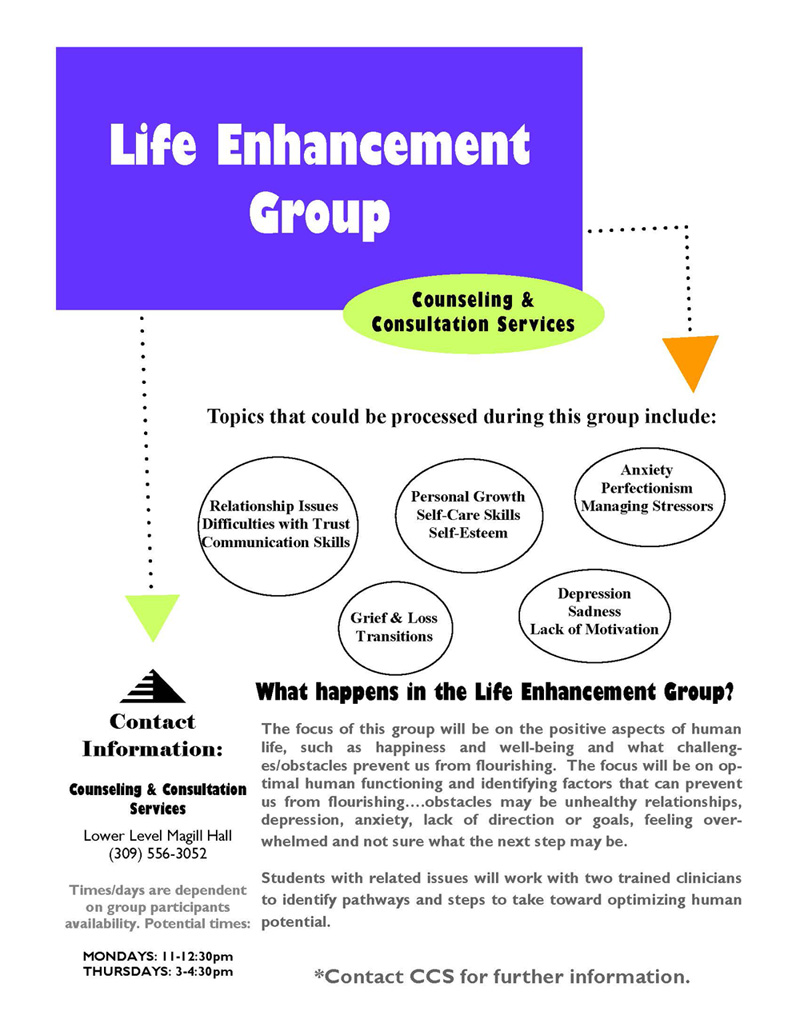Group Therapy Overview
Group Therapy
Often the Best Avenue for Help
We recommend group therapy when we believe it is the most effective treatment method to help you. In fact, it is frequently the treatment of choice. In many ways, group therapy is the very best of what we have to offer. As you consider group therapy, you probably have a number of questions. We hope this information will help answer them.
- What is group counseling all about?
- How does group therapy work?
- What do I talk about in group therapy?
- How long do I stay in group therapy?
- When and how often do groups meet?
- Can I do both group and individual therapies at the same time?
- Common misperceptions about group therapy

What is group counseling all about?
Group counseling brings together a small number of individuals, usually eight to 10, with one or more trained group leaders. Conversation within the group is confidential and not discussed with anyone outside of group sessions.
The group process has many benefits. Members have opportunities to:
-
Share concerns and listen to each other;
-
give and receive feedback;
-
offer support to one another;
-
express feelings;
-
develop new ways of behaving; and
-
learn more about how they interact with others.
How does group therapy work?
While participating in group therapy, people begin to see that:
- they are not alone; and
- others share similar concerns and difficulties in life.
The group is able to:
-
give support;
-
offer alternatives; and
-
gently confront group members.
Through group interactions and group feedback:
- new insights are gained;
- alternative behaviors are explored; and
- new ways of relating to others are tried.
What do I talk about in group therapy?
Common topics for group therapy include conversation about:
- what brought you to the Counseling Center;
- what is bothering you;
- what your goals are;
- what you need, be it support or confrontation; and
- what you expect to gain from group therapy.
Unexpressed feelings are a major reason why people experience difficulties. The most appropriate disclosures will be those that directly relate to your present difficulty. It is important that you feel comfortable with your level of self-disclosure.
How long do I stay in group therapy?
Participation varies from a semester to a year or more.
When and how often do groups meet?
Group sessions are 90 minutes and scheduled once a week at varying times, Monday through Friday.
Can I do both group and individual therapy at the same time?
To make the most of the group therapy experience, staff members prefer that you do one or the other.
Common misperceptions about group therapy:
"I have so much trouble talking to people, I'll never be able to share in a group."
Most people are initially anxious about talking in group therapy. Almost without exception, within a few sessions new members find that the group process draws them in and they begin to share with the group in ways they never anticipated.
"I will be pressured to share my deepest thoughts and feelings with the group."
You control what, how much, and when you share with the group. Many group members find that when the group feels safe enough for members to share what they are most apprehensive about, the group can be very helpful and affirming. At the same time, you can also be helped by listening to others and thinking about how their thought might apply to you.
"Group therapy is second-best to individual therapy."
Group therapy has been recommended to you because your counselor believes that it is the best way to address your concerns. Group therapy is not used at Counseling & Consultation Services as a means of dealing with individual therapy over-flow. Rather, we recommend group therapy when we believe it is the most effective treatment method to help you. In fact, group is frequently the treatment of choice, and group is in many ways the very best of what we have to offer.
"Group therapy will take longer than individual therapy because I will have to share the time with others."
Group therapy is often more efficient than individual therapy for two reasons. First, you can benefit from the group even during sessions when you say little but listen carefully to others. You will find that you have much in common with other group members, and as they work on a concern, you can learn more about yourself. Second, group members will often bring up issues that strike a chord with you, but which you might not have been aware of or brought up by yourself. Therefore, learning from others can be a powerful therapeutic experience and often enhances the work.
"I will be judged, criticized, or verbally attacked by the leaders and by other group members."
It is important that group members feel safe. Group leaders are there to create a safe environment for all involved. As group members come to trust the group, they generally experience feedback and even confrontation as if it were coming from a good friend. One of the benefits of group therapy is the opportunity to receive feedback from others in a supportive environment. It is rare to find friends who will gently point out how you might be behaving in ways that hurt yourself or others, but this is precisely what group therapy can offer. This will be done in a respectful, gentle way, so that you can hear it and make use of it.